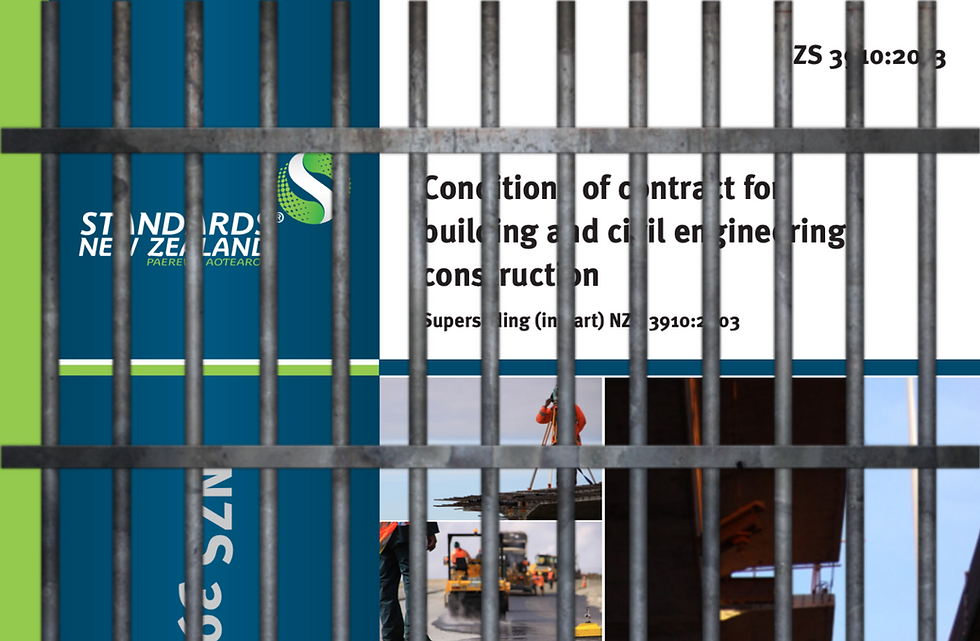The Engineer and Natural Justice
- The NZ Building Economist

- Dec 12, 2021
- 4 min read
Updated: Sep 30, 2023

What is natural justice?
The words “natural justice” have specific meaning in the law. Natural justice comprises two rules, the rule against bias and the rule of the right to a fair hearing. Because of the necessity of maintaining public confidence in the legal system — which includes not only the courts but all public decision making bodies, it is most important that people who are engaged in these processes feel that they have had a fair hearing and that there has been no bias.
Bias can take the form of actual bias or imputed or apparent bias. Actual bias is where it can be established that the person making a decision was prejudiced for or against a party. If the decision maker had a monetary, proprietary or personal interest in the matter then bias may be imputed. Apparent bias is when the conduct or behaviour of the decision maker suggests that their decisions are not impartial.
The right to a fair hearing requires that participants in the justice system should not be penalised by decisions that affect their rights unless they have been given;
[1] prior notice of the case;
[2] fair opportunity to answer the case; and
[3] the opportunity to present their case properly.
[From Peter Smith | Smith Partners | 13 April, 2012 https://smithpartners.co.nz/litigation/what-is-natural-justice/]
What is the Role of Engineer?
6.2.1 The dual role of the Engineer is the administration of the Contract is:
[a] as expert advisor to and representative of the Principal, giving directions to the Contractor on behalf of the Principal, and acting as agent of the Principal in receiving payment claims and providing Payment Schedules on behalf of the Principal; and
[b] Independently of either contracting party, to fairly and impartially make the decisions entrusted to him or her under the contract, to value the work, and issue certificates
The Engineer and the Process to confirm or disallow a variation
NZS3910:2013 sets out for the Engineer to decide whether to confirm or disallow a matter that may involve a variation. The decision is open for question or challenge within 3 months of being given, 13.1.1. If not closed out [timed out] by 13.1.1, the Engineer must review a challenge to a decision within 1 month 13.2.1, and this may be questioned or challenged 13.1.1, and the Engineer may correct or modify the decision prior to the final account 13.2.1, unless either party to the contract, by giving notice, or the Engineer unilaterally choose to issue a final decision 13.2.4.
The Engineer and the process of valuing variations
NZS3910:2013 sets out to value variations before the work commences [9.3.1], with the contractor submitting their valuation and details [9.3.2], or if measured first by the engineer with an exchange of valuations and calcs [9.3.3], endeavouring to seek agreement, or failing which the Engineer shall value according to the valuation rules of 9.3.
Engineer to the Contract’s Three Hats [Reprinted]
[1] The Engineer’s role in advising the Principal 6.2.1 (a) is a strictly private matter between Engineer and Principal.
[2] The Engineer’s role in giving the Principal’s directions to the Contractor 6.2.1 (a) must be understood to represent the Principal’s requirements and NOT the opinion of the Engineer to the Contract. As Principal adviser, it is not for the Engineer to defend, advocate or express any opinion whatsoever to the Contractor about Principal Directions. The Engineer is just a postman when acting as the Principal’s agent, communicating the Principal’s requirements. Except where…
[3] The Engineers role to independently, fairly and impartially make decisions, means any opinion expressed by the Engineer is done so, in their capacity as Engineer to the Contract 6.2.1 (b). The Contractor and the Subcontractor can only interpret ‘every word’ of the Engineer through the filter that only lets the Engineer’s honestly held objective view of the contract pass. That filter can only be applied by the Engineer, who knows full well, everyone presumes it has been applied. It can’t be seen, so we ALL have to trust the Engineer to the Contract.
Any initial Engineers decision, left unchallenged, eventually times out to be a final and binding decision. Great care must be taken, to make good first-round decisions.
Good decision making, the Engineer and Natural Justice
Now let’s consider the rules of natural Justice for when [a] the Engineer is to decide whether to confirm or disallow a matter involves a variation, and [b] the Engineer sets out to value a variation.
The Principal has a close relationship with the Engineer and pays for the service, as is proper. But the effect of this payment is that the Principal commands the Engineers time to discuss matters at his pleasure. Time is money and with matters to be decided by the Engineer, you have to ask yourself, is natural justice being served if the Engineer does not meter out an equal amount of time for the Contractor to discuss the same matters yet to be decided? There is no doubt the Principal decides for himself how much time he gets with the engineer, so the Principal always gets a “fair opportunity to answer the case.” Is natural Justice being denied to the Contractor?
The Engineer knowing full well the Principal’s position and having given his advice to the Principal as to the Engineer's Objective Independent view, of a matter to be decided, the Engineer, after being summoned to give an audience to the Principal, must “in metering out Natural Justice,” consider giving the Contractor a brief on (a) the Principal’s position, (b) the Engineers Objective Independent view, and (c) equal time, to ensure the Contractor is not denied “the opportunity to present their case properly”, before any decision is made.
“Celebrating 50 years of New Zealand Building Economist 1972 to 2021”

By Matthew Ensoll
FNZIQS. Reg.QS.
Editor New Zealand Building Economist.




コメント